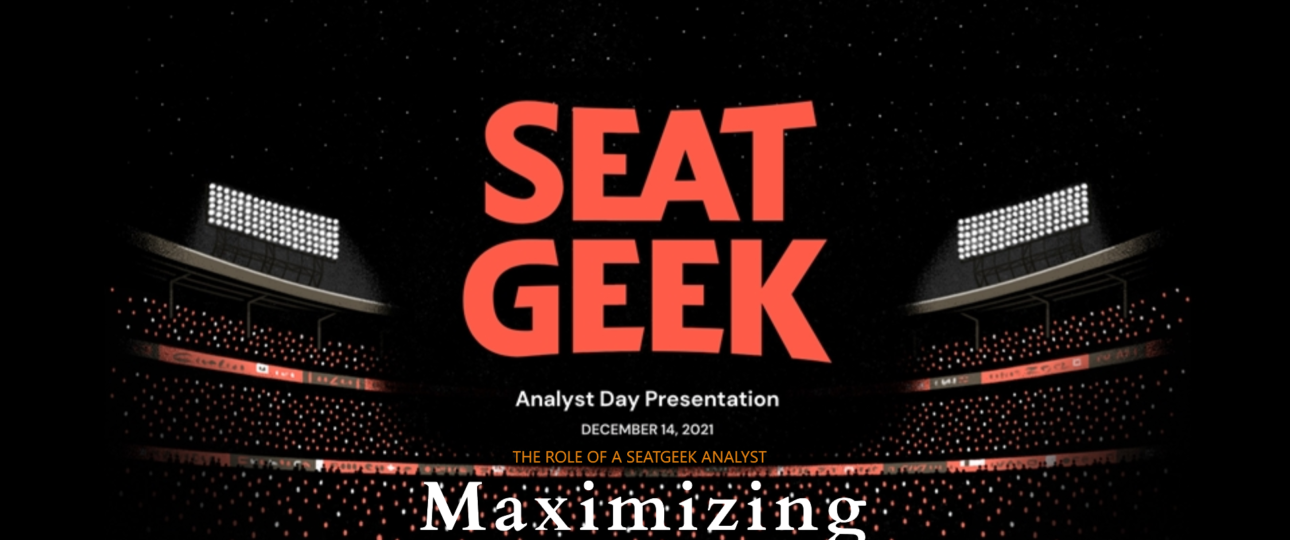SeatGeek is a leading ticketing platform known for its user-friendly approach to finding and purchasing tickets for live events, including concerts, sports, theatre, and more. With headquarters located in New York City, SeatGeek has grown into a trusted name for both ticket buyers and event organizers. In this blog post, we will look into the operations of the SeatGeek corporate office and explore the responsibilities and contributions of a Seatgeek Client Revenue Analyst in shaping the company’s success.
SeatGeek Corporate Office
SeatGeek, founded in 2009 by Jack Groetzinger and Russ D’Souza, was initially regarded as a ticket search engine, allowing users to compare ticket prices across various secondary markets. However, over the years, it evolved into a full-fledged primary and secondary ticketing platform that partners with venues, teams, and artists.
SeatGeek’s business model centres on making ticket-buying as seamless as possible through mobile apps, websites, and partnerships with large-scale sports organizations like the NBA and NFL. It claims an innovative interface that allows users to view seating charts and receive price alerts, all while ensuring transparency and security in their transactions.
The Role of the Corporate Office
The Seatgeek corporate office serves as the operational hub for the company’s multifaceted functions. It is the epicentre of departments such as marketing, sales, product development, and customer support. However, for a technology-driven company like SeatGeek, data analytics and revenue management play a pivotal role in its daily operations. This is where roles such as the Client Revenue Analyst come into the picture, ensuring that the company maximizes profitability while maintaining client satisfaction.
At its core, the SeatGeek corporate office is responsible for driving the overall growth strategy of the business. Whether its building partnerships with sports franchises or fine-tuning SeatGeek’s digital products, all critical decisions funnel through this office. As SeatGeek expands globally, the corporate office now supports international teams and offices, including in Europe and Asia-Pacific.
Client Revenue Analyst
Now, let’s focus on a pivotal role within the corporate structure: the Seatgeek Client Revenue Analyst. Revenue management and analytics have become essential to the growth and sustainability of a company like SeatGeek. Client Revenue Analysts are data experts who ensure that the company optimizes its revenue streams, provides insights to partners, and maintains solid financial performance.
Responsibilities of a Client Revenue Analyst at SeatGeek
The following are the responsibilities of a Seatgeek client revenue analyst:
- Revenue Forecasting and Optimization
One of the primary tasks of a Client Revenue Analyst is to analyse SeatGeek’s revenue data and create projections based on historical trends, upcoming events, and market dynamics.
- Partnership Management
SeatGeek partners with numerous sports teams, venues, and artists, and these partnerships are vital to its business. The Client Revenue Analyst works closely with these partners to provide insights on ticket pricing, demand forecasting, and sales strategies.
- Data Analysis and Reporting
This role involves heavy use of data analytics tools to monitor and analyse sales performance. A Client Revenue Analyst not only assesses internal data but also keeps a close eye on market trends, competitor pricing, and consumer behaviour. Their findings are reported back to the corporate office’s senior management, helping inform business decisions.
- Collaboration with Other Teams
Client Revenue Analysts don’t work in silos. They collaborate with marketing, product, and sales teams to ensure alignment between customer acquisition strategies and revenue goals.
- Pricing Strategy Development
An important function of the Client Revenue Analyst is to develop dynamic pricing models that respond to changes in demand. For instance, playoff ticket prices may rise as demand increases, with the Client Revenue Analyst determining optimal adjustment times.
- Event-Specific Revenue Insights
Every event is unique, and factors such as performer popularity, venue capacity, or even weather can affect ticket sales. A Client Revenue Analyst will analyse each event individually, offering insights into which events are likely to sell out.
Skills and Qualifications Required
To excel as a Client Revenue Analyst at SeatGeek, a candidate needs a strong analytical background, proficiency in data analysis tools like Excel, SQL, and Python, and a solid understanding of financial models. Equally important are strong communication skills, as they often need to present data-driven insights to stakeholders within and outside the company.
Core competencies include:
- Data Analysis & Visualization
- Financial Modelling
- Market Research
- Client Relationship Management
- Revenue Forecasting Techniques
SeatGeek seeks candidates with education in Finance, Economics, or Data Science, plus experience in technology or entertainment.
How SeatGeek Uses Analytics to Drive Growth
The Client Revenue Analyst isn’t the only data-centric role at SeatGeek. Data analytics are a core part of SeatGeek’s business model. By leveraging data on ticket sales, customer preferences, and event performances, SeatGeek provides better services both for end-users and partners.
- Personalized Recommendations
Using predictive analytics, SeatGeek offers users personalized recommendations based on their ticket purchasing behaviour. Personalization, like suggesting similar events or notifying customers of price drops, enhances customer experience and boosts sales.
- Dynamic Pricing
Dynamic pricing is a central element of SeatGeek’s strategy. Client Revenue Analysts play a crucial role in this by ensuring that SeatGeek remains competitive while also maximizing profits. The dynamic pricing model allows the company to adjust prices in real-time, responding to changes in supply and demand.
- Ticket Transparency
SeatGeek has pioneered a ticket transparency feature called Deal Score, which assigns a numerical value to each ticket listing based on its price and the quality of the seat. This feature is driven by a complex algorithm that factors in historical sales data and real-time information. Client Revenue Analysts contribute to refining these algorithms and ensuring that SeatGeek continues to offer valuable insights to customers.
- Revenue Growth through Partnerships
SeatGeek’s partnerships with major sports leagues such as Major League Soccer (MLS) and the National Football League (NFL) have played a critical role in the company’s revenue growth. Client Revenue Analysts provide key insights into how these partnerships can be optimized, ensuring that both parties benefit from the collaboration.
The Importance of SeatGeek Corporate Office in Future Expansion
As SeatGeek continues to expand globally, the corporate office will remain a vital component of the company’s success. The corporate office drives SeatGeek’s growth, managing business development, product innovation, and financial planning under one roof.
By fostering a culture of innovation, SeatGeek’s New York headquarters supports its mission of enhancing live event experiences for both fans and event organizers. SeatGeek’s strong data infrastructure and dedicated analysts, like the Client Revenue Analyst, drive growth in the competitive ticketing market.
The Bottom Line
The role of a Seatgeek Client Revenue Analyst is crucial for optimizing revenue, enhancing partnerships, and supporting data-driven decision-making. With a strong foundation at its corporate office in New York City, SeatGeek continues to push boundaries in the live event industry.




